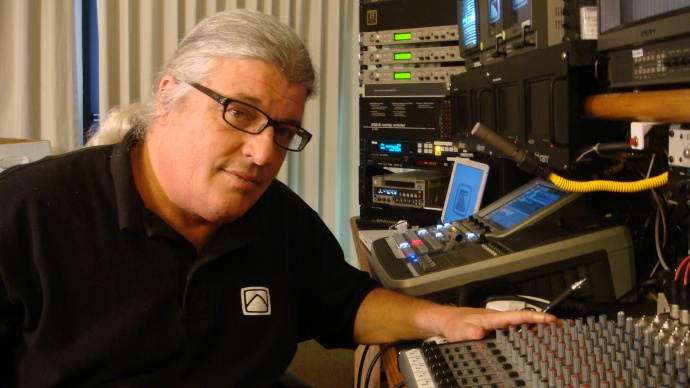Jay April: Akaku, Maui’s Only TV Station
By Sarah Ruppenthal
Jay April isn’t just a part of Hawaii’s media circus—he’s also a ringmaster.
As the president and CEO of Akakü: Maui Community Television (Akakü for short), he is not only a ringmaster of the local media circus, but also a ringleader when it comes to defending our First Amendment rights.
Born and raised near the intersection of Connecticut’s Pequot, Nipmuck and Mohegan rivers, April—who has called Maui home for nearly two decades now—personifies his diminutive home state’s motto: “He who is transplanted still sustains.”
It would be difficult to summarize it here, but rest assured, April’s career (and life in general) is nothing short of extraordinary.
The media maven says he started climbing the ladder as a young producer tasked with making documentaries on portable video “and begging local PBS stations to carry them.”
April’s humble beginnings eventually gave way to an esteemed career as an award-winning television producer, director, video journalist, artist—and all-around nice guy.
When asked to recount his most memorable moments both on and off the air, he lists three: “One was when Allen Ginsberg read a poem into my tape recorder just after he finished writing it, another was when 300 tiny, rare and endangered Hawksbill turtle hatchlings emerged from a nest in the sand and scampered down to the sea,” he recalls, “and the third one was while conducting an interview with the comedian, Jackie Mason… I asked Jackie what the worst room was that he ever worked, and he said, ‘this one, talking to you for free on a Sunday, when I could be out doing something else.’”
Today, April is creating even more memorable moments at Akakü. “I work every day to keep our public, community media stations innovative, open, local and free,” he says.
And it’s not easy. But it’s certainly worth the effort.
“This [Akakü] is your voice,” he says. “This is your ‘electronic park,’ where anyone can come and talk story—most of it local, all of it uncensored and unfiltered. What you see is what we get, and what we get is what you see. We help you put your vision out there.”
April says the greatest reward of his job “is the look on people’s faces when they first learn how to talk to each other using the magic of video.”
And what is the greatest challenge of running Maui’s only electronic public media resource? “The greatest challenge is keeping public access alive in a business dominated by big government and corporate mass media giants,” April says. “It is like preserving a beach. It is electronic green space. Like a public park, it is a place where everyone can go to fully express their points of view…it is a pure First Amendment zone, the only place completely free of corporate speech. More importantly, it represents all the voices of the Maui Nui community, from the most remote and underserved areas and from all walks of life. It is truly the last and only fully democratic media there is.”
If you’re just now tuning in, when it comes to legislation and regulation, Akakü has encountered its fair share of static over the years—and this year has proved to be no exception.
An Oceanic Time Warner Cable (OCTW) franchise renewal—quite possibly, a lease agreement for the next 20 years—proceeding is now underway in Maui County. In short, April explains, “The state [Department of Commerce and Consumer Affairs (DCCA)] wants to know if we are getting a good enough deal from OTWC to let them keep using our public rights of way.”
And is it a good enough deal? “No way, Jose,” he says. “OTWC needs to pay the rent for using our public airwaves and telephone poles. It is time they provide Akakü the same or equal treatment they give O‘ahu broadcast channels.”
In addition, April says, OTWC needs to increase funding, improve its service in rural areas and provide fast and affordable internet to all of its customers. “Not only that,” he adds, “Maui Nui is an international destination, and we should get the same or better deal that OTWC offers any other place in the country.”
April says people need to send an email or write a letter of support to the state DCCA cable division. For anyone who uses a computer or an iPhone, surfs the internet, watches cable television or cares about the future of public community media in Maui Nui, “This could be the most important letter you write this year.”
If you would like to submit a letter of support on behalf of Akakü, email the state DCCA at cabletv@dcca.hawaii.gov before Friday, Sept. 14. To learn more, visit the Akakü: Maui Community Television Website at www.akaku.org.





_1768613517521.webp)



